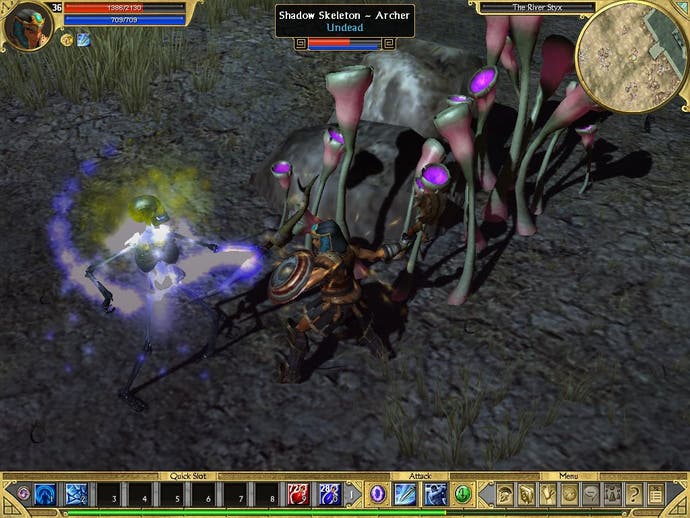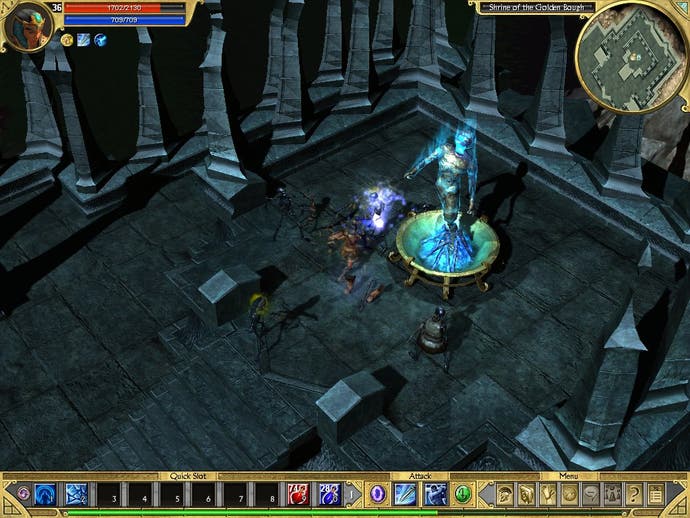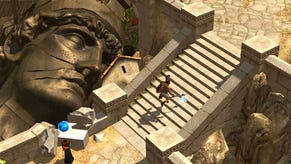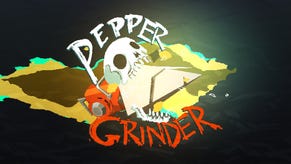Titan Quest: Immortal Throne
Throne in at the deep end.
Onwards with the killing of mythic beasts! We're heading back into ancient mythology with more of the same thump and grunting that made the original Titan Quest so repetitious and yet so mesmerising.
Within just a few minutes of playing the Immortal Throne expansion pack I remembered exactly why I had spent so long playing Titan Quest, and also why it made me feel guilty for doing so. This is the kind of RPG where hitting things and then drinking potions to heal the damage is about the limit of your interaction with the world.
A couple of skill trees allow you to open up a load of buffing and offensive magic-like talents, while the rest of your game will be spent honing a loadout of magical hats and bracers of incredulity +5. It's easy to be cynical about a game made like this, and I was cynical enough for everyone in the review of the original game. Nevertheless I still found myself drawn inwards, this time for a second trawl through the Satyr-infested Hellenic world. There's nothing productive or particularly rewarding about Titan Quest (either in the original incarnation of the game or this well-engineered expansion) but still you go onwards, somehow compelled by the inertia of XP gain to club gorgons to death, and run back and forth out of the aggro-range of powerful monsters. Titan Quest is entrancing - a kind of gaming siren, dragging you onto the reefs of eternal mouse-bashing. The worst thing is: you want to be drawn in.

The new campaign, which makes up a forth chapter in the story, relies on you already having hammered your way through the body of the main game. The level cap has been raised, and you'll be taking your ultra-toned warrior to new heights of skull-cracking competence as you descend into the realms of Hades. These new zones are similar in pace and layout to the original game, and once again the attention to detail in designing the environments is outstanding. Hades manages to portray an unearthly realm with imaginative verve, complete with weirdo fungi-flora and the screams of the about-to-be-cleavered lost souls.
Thanks to this atmosphere you'll be keen engage in hand-to-hand brutality with renewed vigour. Anyone who was thrilled by the mass brawls that characterised the original game will relish the fights that Immortal Throne has in store. You'll still be getting tanked up on potions and maximally enhanced by armour, but there's even more greekness to it, if that's possible, and the fights where you're duking it out with multiple opponents feel like even more of an accomplishment.
Bear in mind, then, that unless you've still got your old character saved, you'll have to blast your way through the entire original campaign to reach the new material in Immortal Throne. That's a pretty long slog, and I can't really recommend anyone purchasing Immortal Throne on that basis. It does improve the overall experience, yes, and there are some changes to the wider game, but they're really fairly minor.
There's a new mastery, dream mastery, which gives you a range of new powers with which you stun and incinerate opponents. Rather than delivering a range of powers that mess with the subconscious of errant Cyclops, the dream powers are actually just more bolts of energy and melee-boosting powers, like all the other masteries. It does mean that your offensive palette is a little different but the changes are so subtle as to be barely worth me finishing this sentence...

There are also spell-scrolls on sale from vendors, allowing you conjure up new abilities on the fly, and allowing you to face boss battles a little earlier than you might have otherwise been able to at a certain level. In the original game I would have gone dungeon crawling to boost a level and then return to a tough boss, now I can just get a decent scroll. Then there are caravans, which, like banks in MMOs, allow you to access items across the map, at any village location with a caravan present. Storing items that you can't use yet becomes habitual, since you would otherwise have been forced to sell them, or to sacrifice vital (and limited) inventory space.
Then there are the artefacts. These are the super-weapons of the Titanic world, and demand that you find the various elements required to craft them, including the recipe, before taking them to a enchant-o-matic vendor and getting them created. After many hours of play I still didn't have any of the elements required to craft anything, although elements of various things (essences of Agamemnon's legs and so forth) did pop up through out my loot harvesting. Eventually it seemed like there was never going to be the right combination of artefact-creating elements and so I gave up on the idea completely. My Ultrahammer Of Much Rending was enough for me anyway.
Ultimately, this is another instance of The Expansion Pack Conundrum. Just what kind of recommendation can a reviewer give regarding something that slightly expands and slightly improves on an original game? Can we really be allowed to say "If you like this sort of thing, you'll like this" and expect to get paid for it? It's a tricky situation. So yeah, the caravan and general interface tweaks (such as inventory auto-sorting) should probably have been in the original game, and they do make the overall experience easier. But you will have to battle through many levels of original material to get to the new chapter, meaning this expansion pack isn't much cop for newbies. Still, I would be lying like a fat-faced liar if I said I didn't enjoy playing Titan Quest again. There's something gripping about the constant surge of beast-slaughter, and who am I to deny such primal urges?










